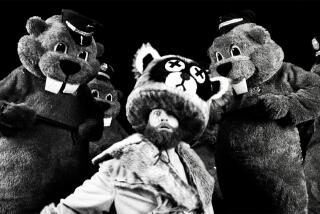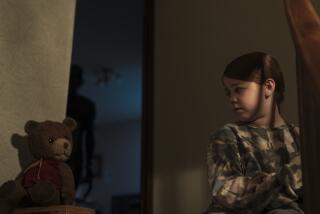From the Archives: ‘Pee-wee’s Big Adventure’ is an oddly comic odyssey
While Pee-wee Herman’s next adventure, “Pee-wee’s Big Holiday” will debut on Netflix on Friday, Paul Reubens’ fan-favorite character first made his feature film debut in “Pee-wee’s Big Adventure.” Based on Reuben’s stage show, “The Pee-wee Herman Show,” the 1985 film also marked the full-length directing debut of Tim Burton. This review of “Pee-wee’s Big Adventure” was originally published in The Times on Aug. 9, 1985.
Anyone over 12 and contemplating a visit to “Pee-wee’s Big Adventure” (citywide) may be a little suspicious about its star, Pee-wee Herman. Isn’t this seemingly deranged TV kiddie-show host, this twitching darling of the post-pubertal set, a bit much? Over the top?
Is he even, perhaps, something darker, more dangerous and pathological? Peter Lorre at his crawliest, poured into Pinky Lee? Soupy Sales on “Speed”?
Pee-wee manages sometimes to be supremely disturbing, to make your teeth itch. Consider his appearance: suit three sizes too small, effete crew cut, clamp-on red bow tie. Consider his manner: the eternal 8-year-old, swinging between manic glee and the petulant, infantile pout of a fastidious child avoiding dog droppings. Consider his enthusiasm: bicycles, toys, Rube Goldberg contraptions. Here is a fellow whose most blood-curdling vice would seem to be a banana split royale with five toppings, followed by five straight Godzilla movies.
See more of Entertainment’s top stories on Facebook >>
Yet there’s an edge there too, a dark cloud around the silver lining. “Pee-wee” is the creation of Los Angeles comic Paul Reubens, and he inhabits this role with the eerily intense, fixed concentration of the late Andy Kaufman as Tony Clifton.
That’s what makes the character work: this sense of absolute, crazed conviction. And it makes the movie work as well — for its own audience.
Be forewarned: This film is not for anyone whose taste in humor runs only to silky Oscar Wildean epigrams or naturalistic comedies of the “Tootsie” school. The wrong crowd will find these antics infantile and offensive. The right one will have a howling good time.
The movie is a comic odyssey. Its focal point is Pee-wee’s stolen bicycle, a gaudy creation coveted by his obese and greedy neighbor Francis. Its theft plunges Pee-wee into a search as desperate and obsessive as that of the impoverished workman in Vittorio De Sica’s “The Bicycle Thief.”
It is said that Italian workmen themselves rejected De Sica’s classic because they couldn’t understand why the guy didn’t go out and borrow another bicycle. But such logic yields the secret of neither De Sica nor Pee-wee. Pee-wee’s bike, like a Hell’s Angel’s hog, is indissolubly wedded to his psyche: talisman, Holy Grail, symbol of its owner’s very being. The loss forces this bubbling man-child out from the guarded citadel of his second childhood into the rude, rough world. There, of course, he finds all those familiar icons of ‘70s “Road” movies — escaped convicts, burly truckers, murderous but comradely bikers, frustrated truck-stop waitresses and assorted rednecks. Somehow, his whimsy infects and disarms them all.
Reubens collaborated on the script with Michael Varhol and Phil Hartman; he’s as clever and ingeniously ingenuous in his writing as in his acting. In a good cast, Mark Holton, as the unspeakable Francis, and Alice Nunn, the sepulchral Large Marge, manage to stand out, perhaps by virtue of their superior girth.
Three of Pee-wee’s associates deserve special mention. Danny Elfman of Oingo Boingo has contributed an amazingly effective score, encompassing everything from kiddietime ricky-tick to rock to parodies of Bernard Herrmann and Ennio Morricone. Billy Weber, for the second time in a year (the first was “Beverly Hills Cop”), delivers impeccably well-timed comedy editing.
And the film’s 26-year-old director, Tim Burton (whose short, “Vincent,” about a little boy obsessed with Vincent Price, was one of the best things from the Disney studio in years), demonstrates that occasionally the Hollywood hype of Wunderkind is deserved.
Then, of course, there’s Pee-wee himself: rabidly active, coy, whining and gleeful. (Who but a kiddie idol created for adults would have a dog named Speck?) He is, of course, an acquired taste. But if you like him (or your children do), there’s no reason his “Big Adventure” shouldn’t amuse you both.
More to Read
Only good movies
Get the Indie Focus newsletter, Mark Olsen's weekly guide to the world of cinema.
You may occasionally receive promotional content from the Los Angeles Times.






